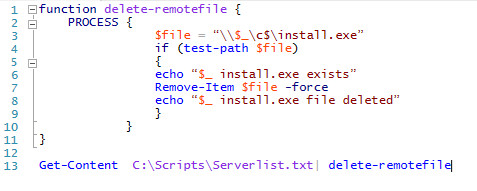
Delete Files from Remote computers
The following PowerShell script recipe will help you delete a remote file based on a list of computers stored in a text file. New PowerShell function will be created during the session which will be piped from the text file.
############################## Script – 1###########################################
function delete-remotefile {
PROCESS {
$file = “\\$_\c$\install.exe”
if (test-path $file)
{
echo “$_ install.exe exists”
Remove-Item $file -force
echo “$_ install.exe file deleted”
}
}
}
Get-Content C:\Scripts\Serverlist.txt| delete-remotefile
#############################Script – 2 ###########################################
function delete-remotefile1 {
PROCESS {
$file = “\\$_\c$\Common Folders”
if (test-path $file)
{
echo “$_ file exists”
Remove-Item $file -force -recurse
echo “$_ file deleted”
}
}
}
function delete-remotefile2 {
PROCESS {
$file = “\\$_\c$\Profiles”
if (test-path $file)
{
echo “$_ file exists”
Remove-Item $file -force -recurse
echo “$_ file deleted”
}
}
}
Get-Content C:\Users\sfa\Desktop\PCList.txt | delete-remotefile1 | delete-remotefile2
#########################Script – 3 ############################################
#Creating an array of your folders
$filelist = @(” \c$\Common Folders”, “\c$\Profiles”)
#Storing file content as computerlist
$computerlist = Get-Content C:\Users\sfa\Desktop\PCList.txt
#We go for a loop for every computer…
foreach ($computer in $computerlist)
{
Write-Host -ForegroundColor Yellow “Analysing $computer”
#And for every file in the filelist
foreach ($file in $filelist)
{
#We recreate the UNC filepath
$newfilepath = Join-Path “\\$computer\” “$filelist”
if (test-path $newfilepath)
{
Write-Host “$newfilepath file exists”
try
{
#We try to remove…
Remove-Item $newfilepath -force -recurse -ErrorAction Stop
}
catch
{
#And there will be an error message if it fails
Write-host “Error while deleting $newfilepath on $computer.`n$($Error[0].Exception.Message)”
#We skip the rest and go back to the next object in the loop
continue
}
#if SUCCESS!!1!1! …
Write-Host “$newfilepath file deleted”
}
}
}

ath8ih
uf1m4m
zqix53
cq2u37
7idoux
I would like to express some appreciation to this writer just for rescuing me from such a circumstance. As a result of looking out throughout the internet and obtaining techniques which are not pleasant, I believed my entire life was gone. Existing without the presence of approaches to the difficulties you have fixed by means of your main review is a critical case, as well as those which may have in a negative way damaged my entire career if I hadn’t come across your web site. Your actual expertise and kindness in controlling every item was crucial. I don’t know what I would have done if I hadn’t encountered such a solution like this. It’s possible to now look ahead to my future. Thanks very much for this skilled and results-oriented help. I will not hesitate to propose your blog to any individual who will need care on this situation.
Thank you, I’ve just been searching for info approximately this subject for ages and yours is the greatest I have discovered so far. However, what about the bottom line? Are you sure concerning the source?
68gy8p
Sweet web site, super style and design, very clean and employ genial.
I am not sure where you’re getting your information, but great topic. I needs to spend some time learning much more or understanding more. Thanks for great information I was looking for this information for my mission.
hneuox
Good blog! I really love how it is simple on my eyes and the data are well written. I am wondering how I might be notified whenever a new post has been made. I’ve subscribed to your feed which must do the trick! Have a nice day!
6g4vxe
6qs9ir
4vpjuq
49qfiq
wn95ui
n6t7tb
iy1yoq
cx0a43
Great blog! Do you have any helpful hints for aspiring writers? I’m planning to start my own site soon but I’m a little lost on everything. Would you propose starting with a free platform like WordPress or go for a paid option? There are so many options out there that I’m completely confused .. Any tips? Thanks a lot!
I am impressed with this internet site, rattling I am a big fan .
g9feov
Hi my friend! I want to say that this article is awesome, nice written and include approximately all vital infos. I would like to see extra posts like this .
Thanks for sharing superb informations. Your web site is so cool. I am impressed by the details that you have on this site. It reveals how nicely you understand this subject. Bookmarked this web page, will come back for more articles. You, my pal, ROCK! I found simply the info I already searched everywhere and simply could not come across. What an ideal web site.
Hey there, I think your site might be having browser compatibility issues. When I look at your website in Firefox, it looks fine but when opening in Internet Explorer, it has some overlapping. I just wanted to give you a quick heads up! Other then that, superb blog!
Outstanding post, you have pointed out some excellent points, I likewise think this s a very good website.
Really instructive and wonderful bodily structure of written content, now that’s user pleasant (:.
I¦ll right away grasp your rss feed as I can’t find your email subscription hyperlink or e-newsletter service. Do you have any? Please permit me realize so that I may just subscribe. Thanks.
Howdy, i read your blog from time to time and i own a similar one and i was just wondering if you get a lot of spam feedback? If so how do you prevent it, any plugin or anything you can advise? I get so much lately it’s driving me insane so any support is very much appreciated.
Terrific paintings! That is the kind of info that are supposed to be shared across the net. Disgrace on the search engines for no longer positioning this publish upper! Come on over and discuss with my web site . Thank you =)